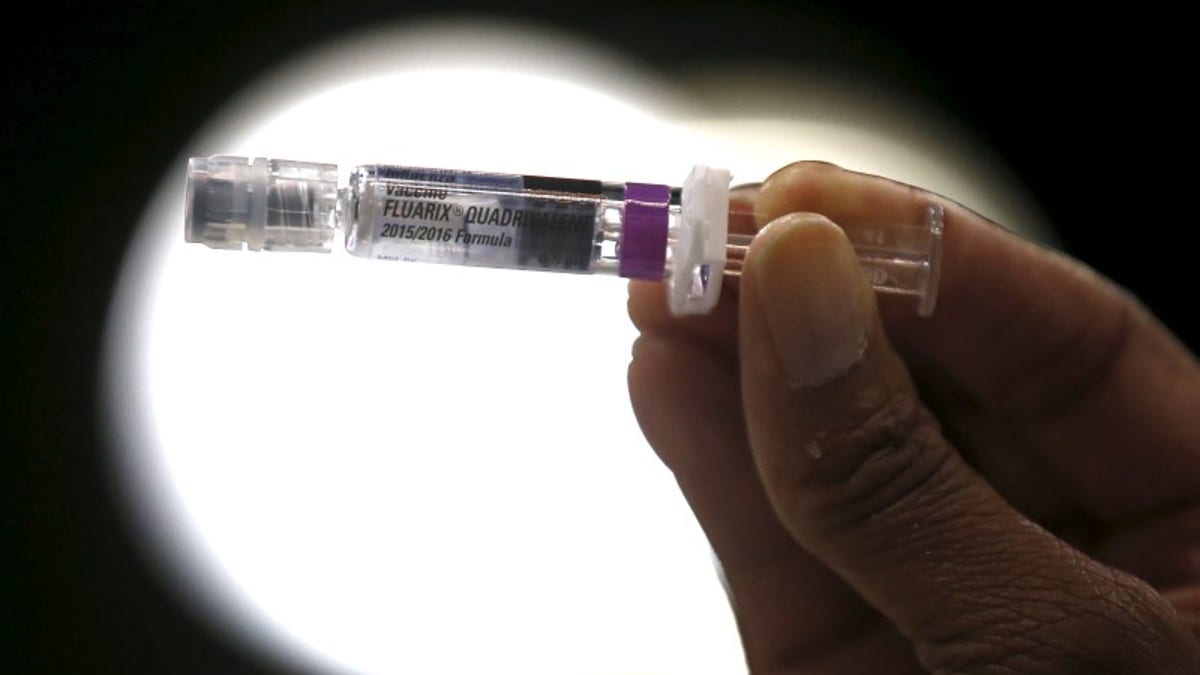
A nurse displays a flu vaccine at a free medical and dental health clinic in Los Angeles (Copyright Reuters 2016)
Where parents were born may influence whether their children get vaccinated, a U.S. study suggests.
Researchers analyzed data on about 277,000 kids living in Washington State, including more than 65,000 with at least one parent born in Somalia, Ukraine, Russia, Mexico or India.
Children of Somali-born parents were 18 percent less likely to get the measles vaccine than kids with two parents born in the U.S., though there were no other disparities for childhood vaccinations.
Compared with children of U.S.-born parents, offspring of people born in Ukraine and Russia were less likely to be immunized in general, while kids born to Mexican and Indian parents were more likely to get inoculations.
"Throughout the U.S., there is significant variation in immunization coverage," said lead study author Dr. Elizabeth Wolf of Children's Hospital of Richmond at Virginia Commonwealth University.
"The phenomenon of clustering of unimmunized individuals has been . . . associated with outbreaks of certain vaccine-preventable diseases such as whooping cough (pertussis) and measles," Wolf added by email. "Clustering can occur within a certain neighborhood, school or place of worship."
Washington State had found a decline in vaccination against measles, mumps and rubella among Somali children compared with non-Somali kids, Wolf said. That made researchers curious to know whether disparities might exist for other childhood vaccinations.
To look at how parental birthplace influenced childhood vaccination rates, Wolf and colleagues reviewed state immunization data to see how many kids received one or more doses of a vaccine protecting against the measles between 12 and 23 months of age.
They also looked at other vaccinations typically administered during that period of childhood, including hepatitis A, pneumococcal and diphtheria-tetanus-acellular pertussis (DTaP).
For measles, kids with parents from Mexico and India were 4 percent more likely to get the vaccine than children with both parents born in the U.S., researchers report in Pediatrics.
Compared with children of U.S.-born parents, kids with Somali parents were 2 percent more likely to receive the pneumococcal vaccine, while kids of Indian parents were 3 percent more likely and children of Mexican parents were 4 percent more likely.
With hepatitis A, children with Indian-born parents were 14 percent more likely to be vaccinated than kids of U.S.-born parents, and kids of Mexican immigrants were 12 percent more likely.
For DTaP, children of Mexican and Indian parents were 5 percent and 4 percent more likely, respectively, to be vaccinated than kids with two parents born in the U.S.
It's possible that vaccine refusal by Russian and Ukrainian parents living in the U.S. may be linked to vaccine resistance in their home countries, the study authors note.
One limitation of the study is that not all births may be included in the statewide vaccination database, the authors point out. They also lacked information on the reasons why some kids might not be vaccinated, such as issues with access to care or affordability.
Even so, the findings highlight the need for pediatricians to discuss cultural beliefs about vaccinations with parents and explain the science behind getting children inoculated to prevent contagious diseases from spreading in the community, said Dr. Matthew Davis, a pediatrics and public policy researcher at the University of Michigan in Ann Arbor who wasn't involved in the study.
"As physicians nurses and public health officials engage hesitant parents to encourage them to vaccinate, it's important to understand the full spectrum of reasons why parents are concerned about the risks of vaccines," Davis said by email.
"When the precise reasons are clear there can be a respectful and effective conversation about the balance of benefits and risks," Davis added.
